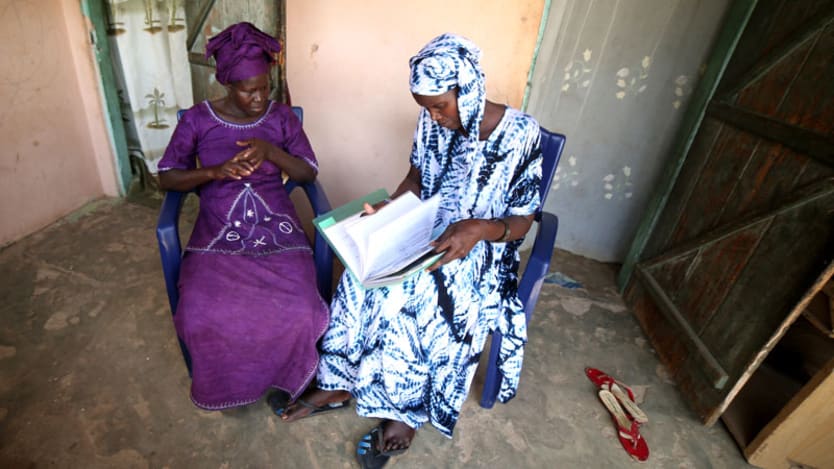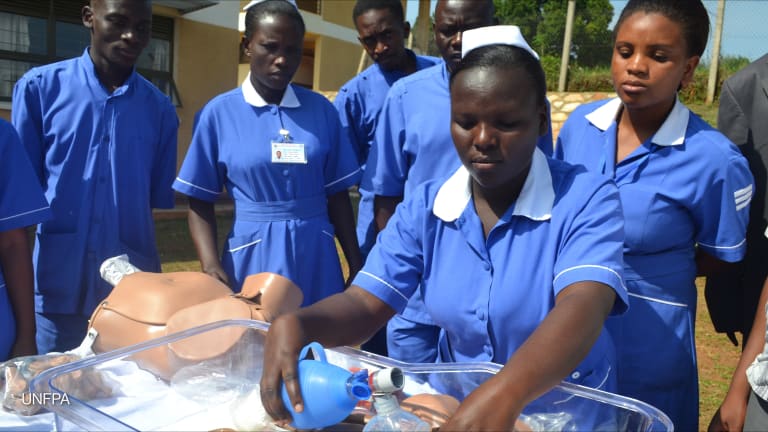
“Before ‘Informed Push’ came, we had stock-outs of all family planning products. Now, I say that ‘the push’ is a revolution.”
Those are the words of the head nurse at a small local health post in Senegal. The Informed Push system she’s referring to is, indeed, a revolution. But it’s one that took years of planning. In 2010, Senegal was poised to reinvigorate its family planning program. The government was strongly committed to achieving the Millennium Development Goals, and at the Ministry of Health we were developing strategic plans to accelerate progress on reproductive health.
We were about to launch the Senegal Urban Health Initiative, an ambitious project designed to increase access to family planning services in Dakar.
But there was a problem: In clinic after clinic, supplies of contraceptive products — pills, injectables, implants, IUDs — were chronically running short. Women who came seeking contraceptives were being turned away empty handed.
At one point, I heard that women were rowing canoes across the Doué River to buy contraceptives on the other side because the shelves at their local health post were empty. Our central warehouses were well-stocked, but the products just weren’t getting to the local facilities.
In 2011, we conducted a study to understand the magnitude of the problem. The results were dire: on average, local health facilities were stocked out of contraceptive pills and injectables on about half of their operating days. The situation with contraceptive implants was even worse, with facilities stocked out more than 80 percent of the time. And 4 out of 5 women reported that they had been unable to obtain their preferred contraceptive in the past year.
What was going on?
Our system to distribute contraceptives from the central warehouses to the local facilities was a “pull-based” model. Each clinic was responsible for forecasting what products would be needed, coming up with the funds, ordering the supplies and picking them up from the central warehouses.
It was an impossibly inefficient system. Medical practitioners, not inventory managers, comprised the local health staff. They didn’t have the resources or the expertise to maintain an adequate stock of supplies.
Our partners at the Senegal Urban Health Initiative, the Bill & Melinda Gates Foundation and IntraHealth, suggested we consider the Informed Push distribution system. This supplier-managed model is similar to the system used in the commercial sector for vending machines. Instead of health clinics having to keep track of their inventory and call in orders, a driver with a truck full of supplies visits each facility on a regular route, topping up the stock as needed.
Informed Push had already been used successfully in Zimbabwe for malaria drugs, and we were starting to use it in Senegal for vaccines. But would it work for contraceptives?
To find out, we piloted a project in Pikine, a suburb of Dakar, between February and July 2012. The results were astonishing: Inventory stock-outs simply disappeared. We decided to go further and commissioned an expansion to the entire Dakar region. More good news: Within six months, the stock-out rate in the region had dropped to less than 2 percent, which is the standard for the commercial sector.
At the same time, a separate study showed the use of contraceptives in Dakar was on the rise. Women were taking advantage of the newly available products.
We had a potential solution to our supply chain problem. However, at the Ministry of Health, we were concerned about feasibility and sustainability. Informed Push was incredibly promising, but to launch it nationwide would be a massive undertaking. Was it logistically and financially possible? And would we be able to maintain the system after the conclusion of donor support?
It was at this juncture that Merck for Mothers and Gates Foundation committed to supporting the national expansion from 2012 to 2015, under the leadership of the Ministry of Health. On the strength of this agreement, we included Informed Push as one of the key pillars of our new national family planning program.
The national rollout of Informed Push has proceeded on schedule, and with excellent results. Local health clinic staff members are thrilled with the new system. The stock-out rate has dropped to less than 10 percent nationwide. In Pikine, where the model has been in place the longest, the contraceptive prevalence rate has already jumped 11 percentage points.
In recognition of these achievements, Senegal is being honored this year with the Resolve Award from the Global Leaders Council for Reproductive Health. This is a true honor for our country, especially for our women and girls, whose lives we strive to improve. But we won’t get too comfortable because we are gearing up for the long-term sustainability of the program. Once the expansion phase is over the system will transition to government control, and we plan to be ready.
From the perspective of our local health care providers, there can be no turning back. As the nurse said, “the push is a revolution.”
We intend to keep revolutionizing our ways until the reproductive health and rights of all women and girls in Senegal are met.
To read additional content on global health, go to Focus On: Global Health in partnership with Johnson & Johnson.
Search for articles
Most Read
- 1
- 2
- 3
- 4
- 5








